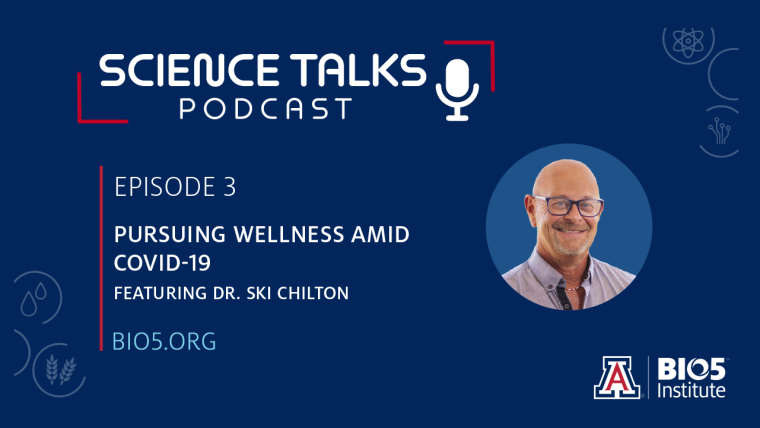
Over the past year, many have become more interested in ways to support their mental, physical and emotional well-bring. Dr. Floyd "Ski" Chilton, BIO5 member and Director of the Precision Nutrition and Wellness Initiative discusses the upcoming Precision Wellness in the Time of COVID-19 public series that aims to educate the public and help them pursue health, both during the pandemic and for years to come. Chilton also shares how he pursues mindfulness and well-being, and how he imparts these messages on others through his research, outreach and books.
Our current Precision Nutrition Wellness series is focused on COVID-19. What would you like the community to learn from this series?
There's a lot of confusion, both within the scientific community and in my neighborhood, about COVID-19.
I constantly hear questions like, “Well, what about this? Or what about that? Or what about this? As we see these new potentially vaccine evading variants, what does it mean for a variant to be able to evade a vaccine? What does it mean that about 10 to 15% of people get very, very sick, and five or so percent of people die? We see this inflammatory storm, and we see in severe cases multiple organ failure and death - what is the driver of that?”
In this series, we start with Mike Worobey, who is incredibly well-known in the evolution of infectious diseases. Then we get into some epidemiology and start to understand population differences. With my talk, we talk about host tolerance and why some people die, and others don’t. Then we end with the psychosocial aspects of the pandemic.
We're all doing everything we can to talk about this in a way that not only scientists understand, but to answer the questions that my neighbors have. This series is really bringing together the whole, the big picture from the population level to the molecular level.
How have you adapted your research and your resources to tackle COVID-19 and bring this to the series that you're leading?
We were so fortunate to have collaborated with some individuals at Stony Brook in New York. They provided us about 365 blood samples from patients either COVID negative, mild, or severe, or deceased.
We do something in my lab called metabolomics, and it uses a million-dollar mass spectrometer machine. It spits out about 2,500 to 3,000 metabolites that are circulating in the blood. By comparing metabolites between patients, we begin to see the networks that are dramatically changing with severe disease. We've really been able to differentiate between people who are severe from those that are going to die from the disease.
Talk a little bit about the collaborative element that helps support your research.
I've been a professor at Johns Hopkins, the University of Colorado, and at Wake Forest before coming to the University of Arizona, and I've never seen anything like BIO5. The transdisciplinary teams at BIO5 are part of the reason I came here, and I was especially interested in working with people in data science, because the combination of data science with biological or biochemical output in the context of a complex disease – especially COVID-19 - really takes a transdisciplinary team to tackle.

